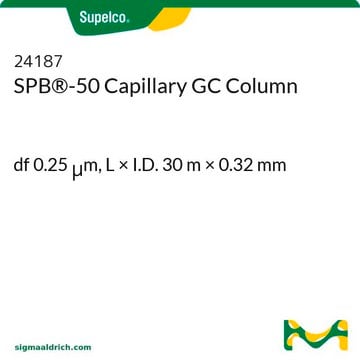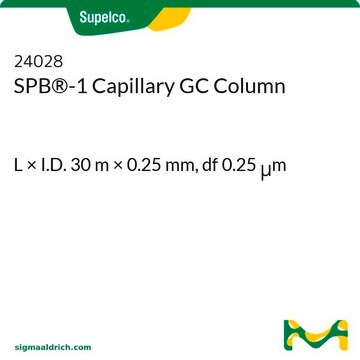28467-U
SLB®-5ms
L × I.D. 30 m × 0.25 mm, df 0.10 μm
Synonyme(s) :
GC column, SPB-5, 5% diphenyl, mass spec
About This Item
Produits recommandés
Matériaux
fused silica
Niveau de qualité
Agence
Standard Method 6040D
EN 2005/108/EC
EPA 610,625,8015,8082,8100,8141,8270,OLM04.2 SVOA
EPA TO-13,IP-8,8270,525.2,608.1/608.2,608/8081/OLM04.2 PEST
JMHLW
NIOSH 2530,5503
OSHA 62
meets requirements for USP G27 and G36
suitable for EPA 1613
Conformité réglementaire
FDA LIB 4423
Paramètres
-60-340 °C temperature (isothermal)
-60-360 °C temperature (programmed)
Valeur bêta
625
df
0.10 μm
Technique(s)
GC/MS: suitable
gas chromatography (GC): suitable
L × D.I.
30 m × 0.25 mm
Groupe de la matrice active
Bonded and highly crosslinked; silphenylene polymer virtually equivalent in polarity to poly(5% diphenyl/95% dimethyl siloxane) phase
Application(s)
agriculture
chemicals and industrial polymers
cleaning products
clinical
cosmetics
environmental
flavors and fragrances
food and beverages
forensics and toxicology
industrial hygiene
life science and biopharma
personal care
petroleum
pharmaceutical (small molecule)
Type de colonne
capillary non-polar
Vous recherchez des produits similaires ? Visite Guide de comparaison des produits
Description générale
USP Code: This column meets USP G27 and G36 requirements.
Phase:
- Bonded and highly crosslinked
- Silphenylene polymer virtually equivalent in polarity to poly(5% diphenyl/95% dimethyl siloxane)
- ≤0.32 mm I.D.: -60 °C to 340 °C (isothermal) or 360 °C (programmed)
- ≥0.53 mm I.D.: -60 °C to 330 °C (isothermal) or 340 °C (programmed)
Application
- An improved method for cyanide determination in blood using solid-phase microextraction and gas chromatography/mass spectrometry.: This study presents an enhanced method for determining cyanide levels in blood, employing solid-phase microextraction combined with gas chromatography/mass spectrometry. This technique improves sensitivity and accuracy, essential for toxicological and forensic analysis (Frison et al., 2006).
- Photochemical production of conjugated linoleic acid from soybean oil.: This research explores the photochemical production of conjugated linoleic acid (CLA) from soybean oil. The study utilized gas chromatography for the analysis of CLA, demonstrating an efficient method for producing this valuable compound with potential health benefits (Gangidi & Proctor, 2004).
- Development of a solid-phase microextraction GC-NPD procedure for the determination of free volatile amines in wastewater and sewage-polluted waters.: This work describes the development of a GC-NPD procedure using solid-phase microextraction for detecting volatile amines in wastewater. This method offers improved detection limits and specificity, which are critical for environmental monitoring and water quality assessment (Abalos et al., 1999).
Autres remarques
Informations légales
Faites votre choix parmi les versions les plus récentes :
Déjà en possession de ce produit ?
Retrouvez la documentation relative aux produits que vous avez récemment achetés dans la Bibliothèque de documents.
Articles
Sigma-Aldrich presents an article about the analysis of melamine and related compounds in dog food with the use of more economical gas chromatography-mass spectrometry (GC-MS) instrumentation.
Contenu apparenté
This page is intended to make it easier to find the consumables you need based on the analytical method you’re using. Methods included on this page come from the EPA, Standard Methods and ASTM.
This page is intended to make it easier to find the consumables you need based on the analytical method you’re using. Methods included on this page come from the EPA, Standard Methods and ASTM.
This page is intended to make it easier to find the consumables you need based on the analytical method you’re using. Methods included on this page come from the EPA, Standard Methods and ASTM.
This page is intended to make it easier to find the consumables you need based on the analytical method you’re using. Methods included on this page come from the EPA, Standard Methods and ASTM.
Notre équipe de scientifiques dispose d'une expérience dans tous les secteurs de la recherche, notamment en sciences de la vie, science des matériaux, synthèse chimique, chromatographie, analyse et dans de nombreux autres domaines..
Contacter notre Service technique




